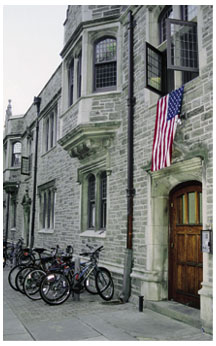October 10, 2001: On the Campus
 Aftershocks
Aftershocks
Students react
to September 11 attacks
By Abhi Raghunathan ’02
After the attacks on September 11, the empty time before classes filled with an unending wait for tragedy to give way to ordinary college life.
No more parties raged in dorm rooms. No more crowds of students walked out to the Street. Tiny, banal tasks like picking out furniture or posters became difficult feats. The telephone circuits jammed with phone calls.
Small groups huddled around radios and computers, listening for news about the attacks in the same way earlier generations had heard about Pearl Harbor and D-Day. About a hundred people gathered in Frist Campus Center, silently watching the planes crash again and again on the giant television screens. And hundreds more attended a candlelight vigil outside McCosh Hall, where they held candles and sang and prayed.
For a while it seemed that there was nothing to do other than feel as dead as the bodies being pulled from the wreckage. The details of the tragedy could be heard from the hundreds of televisions, radios, and computers blaring news of death tolls and arrests. News anchors like Peter Jennings replaced music groups like Dave Matthews and U2 as the voices heard most often on campus. Walking to the U-Store necessarily meant picking up snippets of information, hearing phrases like “The search continues,” and “I hope he’s OK.” Time began to be measured in developments: the first death toll, the first arrest, the first recovery of a black box.
The tight and enclosed nature of the college community also ensured coming across symbols of hope and recovery. Flags hung from dorm room windows. E-mails asking if so-and-so had gotten on that flight from Boston or left her office in time filled in boxes. Notices for prayer and counseling appeared all over campus, sometimes taped over posters or flyers promoting shows and musical groups. A number of students volunteered to give blood, to answer phones, to do anything. A few rashly declared that they would go to New York as soon as transportation opened up and dig through the rubble.
But there was a desire to move towards normalcy amid the gloom and desperation. President Shirley Tilghman told the freshman class on the day of the attack that the university would provide help, but that academics would not stall because of terrorism. “We will get on with the business of education,” she said.
Hundreds of seniors trying to do something other than mope around attended a party the day after the attacks at Triumph Brewing Company on Nassau Street, where they drank beer and ate free food. Spence Miller, president of the class, sent an e-mail explaining why he had not called the party off.
“I wrestled with canceling this event, but I really want us all to come together as a class this evening by talking through such events,” he wrote to the class.
A jazz band played at the party, but so did CNN. Conversations were interrupted, as they had been all week, by news of the crash that scrolled on TV screens. “Life goes on,” said some people who went.
But Lawnparties did not. The
Inter-Club Council canceled the event and encouraged students to go instead
to a memorial service on Cannon Green. Another celebration was canceled
to make room for mourning, a sign that the drama would go on for a long,
long time before any sort of finality to the sadness was even vaguely
conceivable. ![]()
Abhi Raghunathan ’02 (abhishek@princeton.edu) is an English major from Tucker, Georgia.
